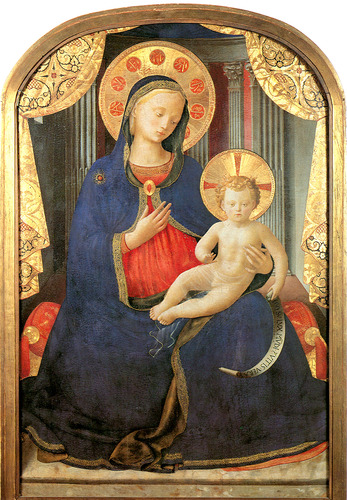
The Life of the Blessed Virgin Mary by Blessed Anne Catherine Emmerich
19. HEROD'S STATE OF MIND - A MURDER.
Herod was in a state of ill-humor and vexation in these days. At the time of Christ's birth he had been in his palace near Jericho and had committed a vile murder. He had insinuated adherents of his into the higher posts of the Temple to find out what was going on there so as to warn him of anyone opposed to his designs. One of these in particular was a high official in the Temple, a good and upright man. He invited this man with friendly words to visit him at Jericho, but caused him to be waylaid and murdered in the desert on his way there, making it appear as the work of robbers. A few days later he came to Jerusalem in order to take part in the feast of the dedication of the Temple on the 25 ^th day of the month Kislev, and there he became involved in a very disagreeable affair. He wanted to do something in his own way which would please the Jews and do them honor. He had a golden image made of a lamb, or rather of a kid, for it had horns. This was to be set up for the festival over the gate leading from the outer court of the women into the Court of Sacrifice. He proposed to force this arrangement on the Jews and yet expected to be thanked for it. The priests opposed it, so he threatened them with fines, whereupon they declared that they would pay the fine, but that their law forbade them ever to accept the image. Herod, bitterly angered, tried to put up the image in secret; but when it was brought into the Temple, it was seized by a zealous official and flung to the ground, so that it broke in two. [134] A tumult ensued, and Herod had the official imprisoned. This affair had so angered him that he regretted coming to the feast. His courtiers endeavored to distract him with all kinds of entertainments.Now came the rumors of Christ's birth to add to Herod's uneasiness. Of late there had arisen among certain devout Jews a lively sense of the near approach of the Messiah. The events attending the birth of Jesus had been spread abroad by the shepherds, but all this was looked on by important people as nonsensical gossip. It had come to Herod's ears, and he had secretly made inquiries at Bethlehem. His messengers came to the Crib three days after Christ's birth [see above, p. 102 ], and after talking with St. Joseph, a poor man, they reported, as all arrogant people like them are wont to do, that there was nothing to be seen but a poor family in a miserable cave, and that the whole thing was not worth talking about. To begin with, they were too arrogant to talk properly to St. Joseph, all the more as they had been warned not to cause any sensation. Now, however, Herod was suddenly confronted by the three kings and their numerous company, and was filled with fear and dismay, for they came from a long way off and their story could not be dismissed as idle talk. When however they inquired so particularly about the newborn King, he feigned a desire to worship Him too, much to their joy. He was in no way reassured by the blind arrogance of the scribes, and was determined in his own interests that the event should remain as unnoticed as possible. He did not at once oppose the statements made to him by the kings, nor did he at once lay hands on Jesus, for by so doing he feared to give the impression to the people (who were already in a difficult frame of mind) that the kings' announcement was true and of serious consequence to himself. He therefore planned to gain more accurate information from the kings before taking steps himself about it. When the kings, warned by God, failed to return to him, he announced that their flight was a proof that they had either been disappointed in their search or had been lying. He caused it to be spread abroad that they had been ashamed and afraid to come back, because they had so greatly deceived themselves and others; what other reason could there be for their secret flight, when they had been received by him in so friendly a manner? In this way he stopped all further rumors and merely let it be known in Bethlehem that no one should have anything to do with that family and that no attention should be paid to misleading rumors and imaginations. When the Holy Family returned to Nazareth a fortnight later, it put an end to the talk about an event which had never become clearly known to most people. The devout ones hoped in silence. When all was calm once more, Herod planned to do away with Jesus, but heard that the family with the Child had now left Nazareth. For a long time he caused search to be made for the Child, and when he was forced to give up hope of finding Him, his anxiety increased, and he had recourse to the desperate measure of the Massacre of the Innocents. He took stringent precautions and ordered a number of troop movements in order to prevent any insurrection. I think the children were murdered in seven different places.
CONTENTS | NEXT | FOOTNOTESCopyright ©1999-2023 Wildfire Fellowship, Inc all rights reserved

 Keep Site Running
Keep Site Running